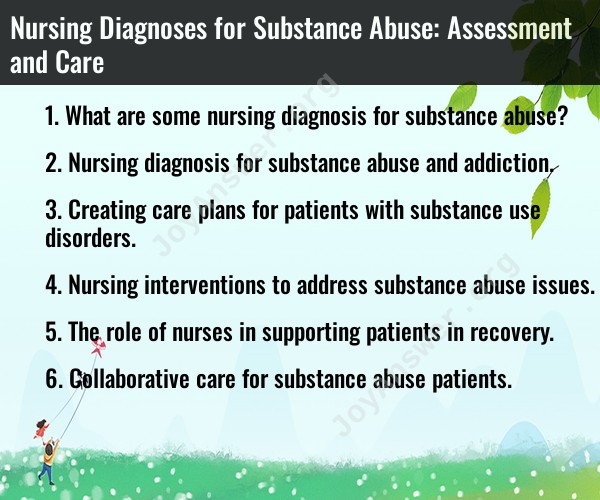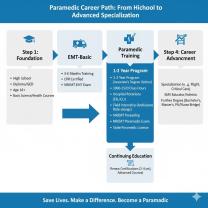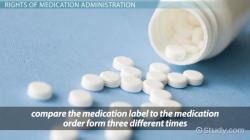What are some nursing diagnosis for substance abuse?
Nursing diagnoses for substance abuse focus on identifying the health problems and issues associated with a person's substance use. These diagnoses help nurses and healthcare providers create care plans to address the physical, psychological, and social aspects of substance abuse. Here are some nursing diagnoses commonly associated with substance abuse:
Risk for Infection:
- Substance abuse can lead to behaviors that increase the risk of infections, such as sharing needles or engaging in risky sexual behaviors.
Impaired Skin Integrity:
- The use of certain substances, like methamphetamine, can lead to skin problems and open sores due to compulsive scratching.
Risk for Injury:
- Substance abuse can impair judgment and coordination, increasing the risk of accidents and injuries.
Ineffective Coping:
- Many individuals use substances to cope with stress or emotional issues. When these coping mechanisms are dysfunctional, it can lead to the diagnosis of ineffective coping.
Risk for Violence: Self-Directed or Other-Directed:
- Substance abuse can lead to impulsive and violent behaviors, whether directed at oneself or others.
Ineffective Health Maintenance:
- Individuals with substance abuse problems may neglect their general health and well-being, including regular medical check-ups and vaccinations.
Imbalanced Nutrition: Less Than Body Requirements:
- Poor eating habits and nutritional deficiencies are common in substance abusers, leading to this diagnosis.
Disturbed Sleep Pattern:
- Substance abuse can disrupt sleep patterns, leading to difficulties falling asleep, staying asleep, or experiencing restorative sleep.
Ineffective Therapeutic Regimen Management:
- Individuals struggling with substance abuse may not adhere to prescribed treatment plans or medication regimens.
Risk for Unintentional Poisoning:
- This diagnosis is relevant when substance abuse involves toxic or harmful substances that can lead to poisoning.
Deficient Knowledge:
- Individuals may lack knowledge about the consequences and risks associated with substance abuse.
Risk for Impaired Parent/Child Attachment:
- Substance abuse can negatively impact family relationships and parent-child attachments.
Risk for Social Isolation:
- Substance abuse can lead to social withdrawal, isolation, and strained relationships, increasing the risk of this diagnosis.
Ineffective Role Performance:
- Substance abuse can interfere with a person's ability to fulfill roles and responsibilities at work, in the family, and in the community.
Risk for Homelessness:
- Substance abuse can contribute to housing instability and homelessness.
Altered Family Processes:
- Substance abuse can disrupt family dynamics and lead to unhealthy family processes.
These nursing diagnoses are important in assessing and addressing the complex health and psychosocial issues associated with substance abuse. They serve as a basis for developing care plans that aim to help individuals with substance abuse problems achieve better health and well-being while addressing the underlying causes of their substance use.
Nursing diagnosis for substance abuse and addiction
Substance use disorder (SUD) is a broad term that encompasses a range of problems related to the use of alcohol and drugs. Nurses play a vital role in identifying and diagnosing SUD in patients, as well as providing support and care to those who are struggling with addiction.
Some of the nursing diagnoses that may be appropriate for patients with SUD include:
- Ineffective coping: This diagnosis is appropriate for patients who are using substances to cope with stress, trauma, or other difficult emotions.
- Risk for injury: This diagnosis is appropriate for patients who are engaging in risky behaviors while under the influence of substances, such as driving while intoxicated or engaging in unprotected sex.
- Altered health maintenance: This diagnosis is appropriate for patients whose substance use is interfering with their ability to take care of themselves, such as eating a healthy diet or getting enough sleep.
- Impaired social functioning: This diagnosis is appropriate for patients whose substance use is causing problems in their relationships or interfering with their ability to work or go to school.
Creating care plans for patients with substance use disorders
Once a nursing diagnosis has been made, nurses can develop a care plan to address the patient's needs. The care plan should be individualized and tailored to the patient's specific situation.
Some common goals for care plans for patients with SUD include:
- Promoting abstinence from alcohol and drugs: This may involve helping the patient to develop a relapse prevention plan or to access treatment resources.
- Addressing the underlying causes of the patient's substance use: This may involve helping the patient to work through trauma or other difficult emotions.
- Teaching the patient healthy coping skills: This may involve teaching the patient relaxation techniques or how to deal with stress in a healthy way.
- Supporting the patient's recovery: This may involve providing the patient with emotional support, connecting them with support groups, or helping them to access other resources.
Nursing interventions to address substance abuse issues
Nurses can use a variety of interventions to address substance abuse issues in patients. Some common interventions include:
- Education: Nurses can provide patients with information about the effects of substance use and the risks of addiction.
- Assessment: Nurses can assess patients' substance use habits and identify any potential risks.
- Counseling: Nurses can provide patients with counseling and support to help them address the underlying causes of their substance use and develop healthy coping skills.
- Referral: Nurses can refer patients to appropriate treatment resources, such as drug rehab programs or support groups.
The role of nurses in supporting patients in recovery
Nurses play a vital role in supporting patients in recovery from substance abuse. Nurses can provide patients with emotional support, connect them with resources, and help them to stay on track with their recovery goals.
Nurses can also advocate for patients with SUD and help to reduce the stigma associated with addiction.
Collaborative care for substance abuse patients
Collaborative care is an approach to treating substance abuse that involves a team of healthcare professionals working together to provide comprehensive care to the patient. The team may include nurses, doctors, therapists, and social workers.
Collaborative care has been shown to be effective in improving outcomes for patients with SUD. Nurses play a key role in collaborative care teams by providing patients with support and education, and by coordinating care with other members of the team.
Conclusion
Substance use disorder is a complex problem with no easy solutions. However, nurses can play a vital role in helping patients to overcome addiction and achieve recovery. By providing education, support, and referral to appropriate resources, nurses can help patients to get the treatment they need to live healthy and fulfilling lives.












